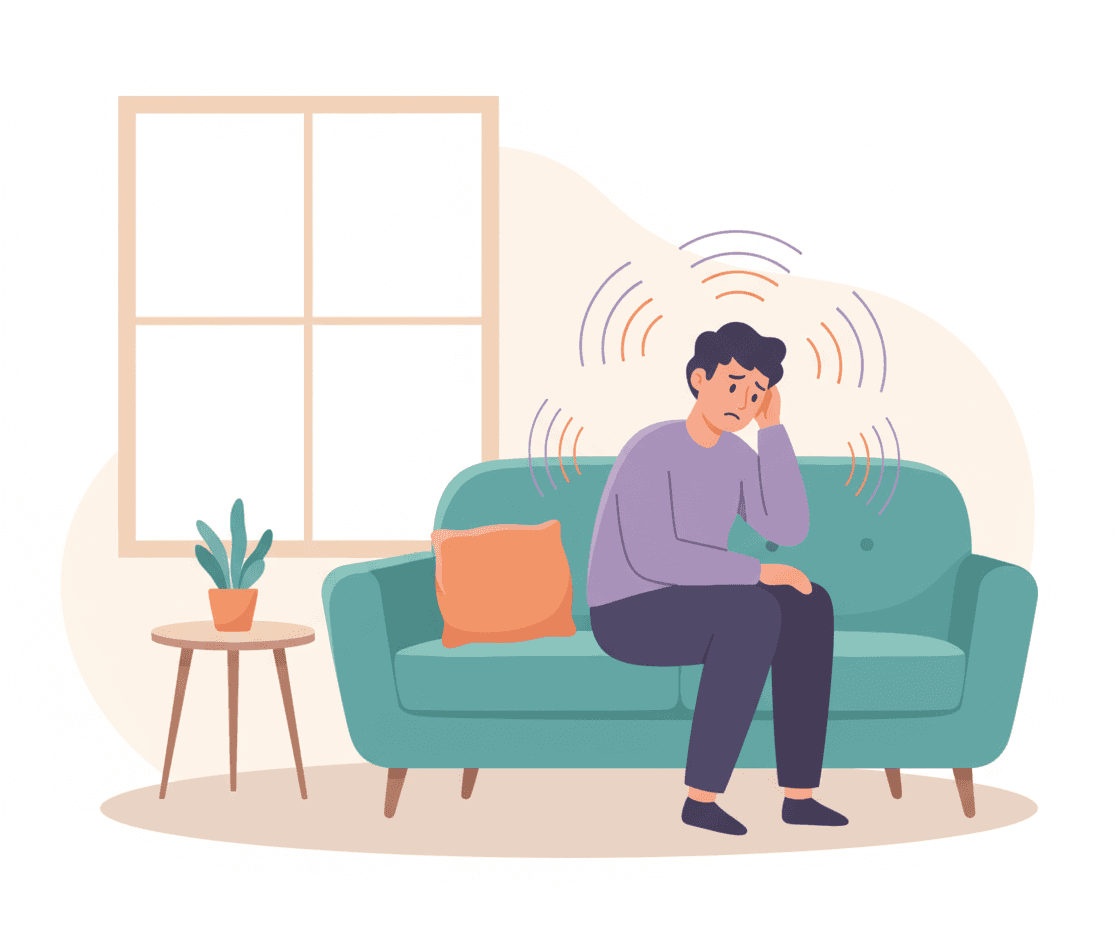Migraine Headaches

Overview
Migraines affect over 4.9 million Australians, making them one of the most common neurological conditions in our community. At Cura Medical Specialists in Drummoyne, our expert neurologists understand that migraines are far more than "just headaches" – they're complex neurological events that can significantly impact your quality of life.
What is a Migraine?
A migraine is a neurological disorder characterised by recurrent, moderate to severe headaches that typically affect one side of the head. Unlike tension headaches, migraines involve complex changes in brain chemistry and blood flow, often accompanied by sensory disturbances, nausea, and sensitivity to light and sound. The condition is believed to result from abnormal brain activity affecting nerve signals, chemicals, and blood vessels in the brain.
Migraines are classified as a primary headache disorder, meaning they’re not caused by another underlying condition. The World Health Organisation ranks migraines as the second most disabling condition globally, recognising their profound impact on individuals’ personal, professional, and social lives. In Australia, migraines are responsible for more than 1.5 million days of reduced work productivity each year.
Recognising the Warning Signs
Understanding migraine symptoms is crucial for early intervention and effective management. Migraines typically progress through four distinct phases, though not everyone experiences all stages:
- Prodrome Phase (hours to days before):
- Mood changes, including depression or euphoria
- Food cravings or loss of appetite
- Increased thirst and urination
- Neck stiffness
- Frequent yawning
- Constipation or diarrhoea
- Aura Phase (5‑60 minutes):
- Visual disturbances (zigzag lines, blind spots, flashing lights)
- Tingling or numbness in face or hands
- Difficulty speaking
Attack Phase (4‑72 hours):
- Throbbing or pulsating pain, usually on one side
- Pain that worsens with physical activity
- Extreme sensitivity to light, sound, and sometimes smell
- Nausea and vomiting
- Blurred vision
- Light‑headedness, sometimes followed by fainting
Postdrome Phase (up to 24 hours after):
- Confusion and moodiness
- Dizziness and weakness
- Continued sensitivity to light and sound
- General feeling of being "drained" or "washed out"
Urgent medical attention is needed if you experience:
- Sudden, severe headache unlike any previous headache
- Headache with fever, stiff neck, confusion, or vision loss
- Headache following a head injury
- Chronic headache that worsens despite treatment
- New headache pattern in people over 50
Common Causes & Risk Factors
Migraines often run in families, with about 70% of sufferers having a family history of the condition. If one parent has migraines, the risk for their children is around 40%, increasing to 75% if both parents are affected.
Common triggers include:
- Hormonal changes in women (menstruation, pregnancy, menopause)
- Dietary factors like aged cheeses, processed meats, MSG and artificial sweeteners
- Environmental stimuli such as bright lights, strong smells or weather changes
- Stress and anxiety, both during and after stressful periods
- Sleep disruptions, including too much or too little sleep
- Physical factors like intense exercise or sexual activity
- Medications including oral contraceptives and vasodilators
- Alcohol and caffeine, particularly red wine and withdrawal from caffeine
Risk factors:
- Age – migraines typically begin in adolescence and peak in the 30s and 40s
- Sex – women are three times more likely to experience migraines than men
- Medical conditions such as depression, anxiety, sleep disorders or epilepsy
- Lifestyle factors such as irregular meal patterns, dehydration and poor posture

Diagnosis at Cura Medical Specialists
At Cura Medical Specialists, we take a thorough approach to diagnosing migraines. Dr. Emma Harrison leads our dedicated headache clinic, working closely with Dr. Mahtab Ghadiri and Dr. David Manser to evaluate each patient's unique presentation.
Our diagnostic process includes:
Detailed medical history – we conduct comprehensive interviews covering your headache patterns, family history, triggers and previous treatments. Assessment tools like the Migraine Disability Assessment (MIDAS) or the Headache Impact Test (HIT6) questionnaires help us understand how migraines affect your daily life.
Neurological examination – a complete physical and neurological check helps rule out secondary causes and identifies any neurological signs that may require further investigation.
Headache diary analysis – we ask patients to keep structured diaries for several weeks to track patterns, triggers and responses to treatments. This information guides personalised management plans.
Advanced imaging (when indicated) – while most migraine diagnoses don’t require scans, we may recommend MRI or CT imaging if you experience unusual symptoms, a sudden severe headache or neurological abnormalities.
Specialised tests – depending on your presentation, we might order blood tests to check for inflammatory markers, thyroid function or vitamin deficiencies that could contribute to headaches.
Treatment Options
Our team offers a comprehensive range of migraine treatments, combining medications with lifestyle strategies to give you the best chance of long-term relief.
Acute treatment (to stop attacks):
- Simple analgesics – paracetamol, aspirin or NSAIDs for mild to moderate migraines
- Triptans – sumatriptan, rizatriptan and other triptans for moderate to severe attacks
- Anti‑emetics – medications to control nausea and improve absorption of other treatments
- Gepants – a new class of medications (e.g. rimegepant) now available in Australia
- Ditans – latest acute treatments for patients who can’t use triptans
Preventive treatments:
- Oral medications – beta‑blockers, anticonvulsants (topiramate, valproate) and certain antidepressants
- CGRP antagonists – monthly injections such as erenumab, galcanezumab and fremanezumab
- Botulinum toxin – proven effective for chronic migraine (15+ headache days each month)
- Greater occipital nerve blocks – targeted injections for specific migraine patterns
- Neuromodulation devices – therapies like transcranial magnetic stimulation (TMS) and vagus nerve stimulation
Lifestyle modifications:
- Regular sleep schedules and stress management techniques
- Dietary changes and trigger avoidance
- Regular aerobic exercise, yoga and stretching
- Cognitive behavioural therapy, biofeedback or mindfulness practices
- Complementary therapies such as acupuncture or physiotherapy for selected patients

Why Choose Cura Medical Specialists?
Cura Medical Specialists stands at the forefront of migraine care in Sydney, offering several advantages that set us apart:
- Specialised expertise – our headache specialists, particularly Dr. Emma Harrison, have extensive experience in complex migraine management and stay current with the latest international guidelines.
- Comprehensive care approach – we treat the whole person, combining medical management with lifestyle counselling, psychological support and complementary therapies where appropriate.
- Access to advanced treatments – as a leading neurology practice we offer access to the newest migraine therapies, including CGRP antagonists and neuromodulation devices, often before they’re widely available.
- Convenient Drummoyne and Penrith locations – our modern clinics offers ample parking and is easily accessible from across Sydney, with flexible appointment scheduling for urgent consultations.
- Collaborative care model – we work closely with your GP, other specialists and allied health professionals to ensure coordinated care that addresses all aspects of your migraine condition.
Living with Migraines
Effective migraine management extends beyond medications. Our patients achieve the best results when they actively participate in their care by making lifestyle changes and monitoring their condition.
Key strategies include:
- Trigger management – maintain a detailed migraine diary or use a smartphone app to identify patterns, triggers and early warning signs.
- Stress reduction – practise mindfulness meditation, progressive muscle relaxation or guided imagery to decrease migraine frequency.
- Sleep hygiene – keep consistent sleep and wake times, create a dark quiet bedroom and avoid screens at least an hour before bed.
- Dietary considerations – eat regular meals, stay well hydrated and avoid individual trigger foods such as aged cheese, chocolate and red wine.
- Exercise programme – engage in regular, moderate aerobic exercise like walking or swimming, gradually increasing intensity as tolerated.

Frequently Asked Questions
- Are migraines hereditary? Migraines have a strong genetic component. If you have a first-degree relative with migraines, you're significantly more likely to develop them. However, environmental factors and triggers also play crucial roles in whether migraines manifest.
- Can migraines be cured? While there's no cure for migraines, they can be effectively managed. Many patients achieve excellent control with preventive treatments, reducing attack frequency by 50% or more. Some people experience fewer migraines as they age, particularly women after menopause.
- How do I know if my headache is a migraine or something else? Migraines typically involve moderate to severe throbbing pain, often on one side, accompanied by nausea and sensitivity to light and sound. They last 4-72 hours and worsen with physical activity. If you're unsure, our specialists can provide a definitive diagnosis.
- Are the new CGRP medications available in Australia? Yes, several CGRP antagonists are now available in Australia, with some PBS-listed for patients meeting specific criteria. Our specialists can assess your eligibility and discuss whether these treatments are appropriate for you.
- Can children get migraines? Yes, migraines can occur in children as young as 18 months old, though they're most commonly diagnosed in adolescence. Childhood migraines may present differently, with shorter duration and bilateral pain being more common.
When to Seek Medical Help
Immediate medical attention is essential if you experience:
- Thunderclap headache (sudden, severe pain reaching maximum intensity within seconds)
- Headache with neurological symptoms like weakness, numbness, or difficulty speaking
- Progressive worsening of headache pattern over days or weeks
- New headache after age 50 or significant change in established pattern
- Headache with systemic symptoms like fever, weight loss, or night sweats
Schedule a consultation with our specialists if you have:
- Migraines occurring more than four days per month
- Migraines not responding to over-the-counter treatments
- Medication overuse (using pain relief more than 10 days monthly)
- Significant impact on work, school, or daily activities
Book Your Consultation Today
Don't let migraines control your life. The expert team at CURA Medical Specialists is ready to help you achieve better migraine control and improved quality of life. Our comprehensive approach, combining cutting-edge treatments with personalised care strategies, has helped thousands of Sydneysiders reclaim their lives from migraine.
Contact us today on (02) 7906 8356 or book online through our secure patient portal. Our friendly staff will arrange a consultation with the most appropriate specialist for your needs, ensuring you receive expert care from your very first visit.
Support and Resources
Australian Resources:
- Headache Australia: National patient advocacy organisation providing education and support
- Brain Foundation: Comprehensive resources on neurological conditions including migraines
- Migraine & Headache Australia: Support groups and educational programmes
- healthdirect: Government-funded health advice service (1800 022 222)
Useful Apps and Tools:
- Migraine Buddy: Comprehensive tracking and pattern analysis
- CatchMyPain: Pain diary with weather tracking
- Headache Diary Pro: Medical-grade tracking tool
Emergency Contacts:
- Emergency Services: 000
- Poisons Information Centre: 13 11 26
- Mental Health Line: 1800 011 511

Dr. Hugh Stephen Winters
Stroke and Interventional Neurologist, MBChB (Auckland), FRACP (Neurology), CCINR (Neurology)
Reviewed on: 13 September 2025


